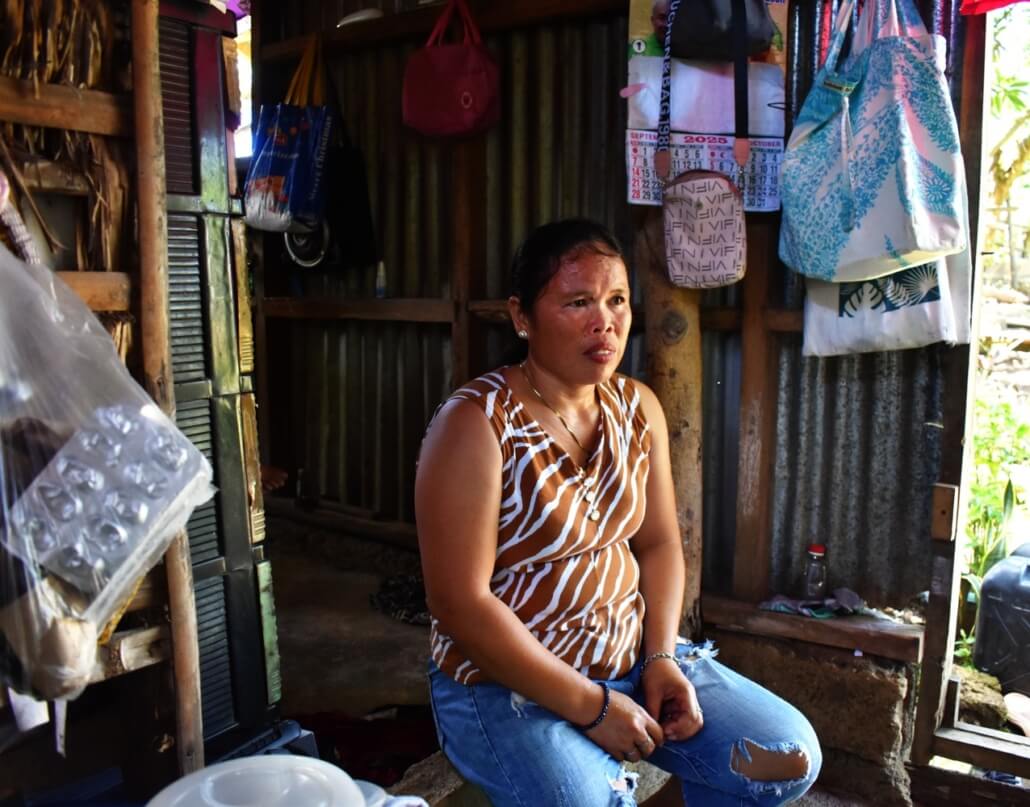Returning to the life they knew: Joanna’s story after Typhoon Opong (Bualoi)
PALANAS, MASBATE ─ Joanna Pilapil, 40 years old, grew up in the same barangay where she and her husband, Richie, are now raising their three children. In Barangay Miabas, their humble home kept them safe for years. Now, Joanna and her family find themselves struggling to rebuild the life they had before the devastation left by Typhoon Opong (International name: Bualoi).
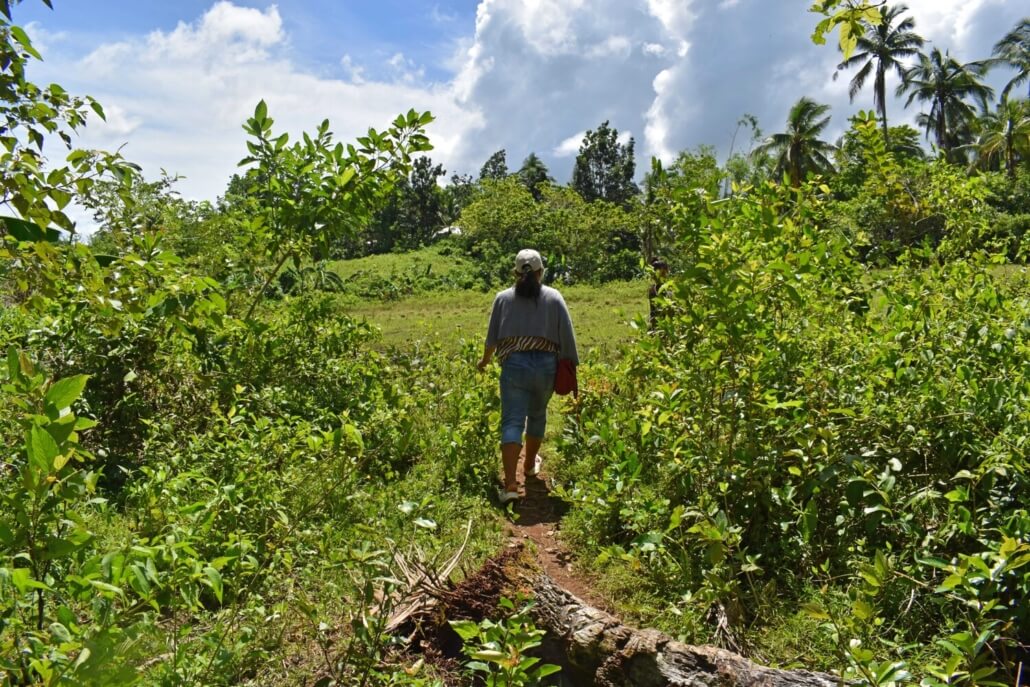
In photo: Joanna Pilapil shows Action Against Hunger staff the way to her house in Barangay Miabas, Palanas, Masbate. Photo by Martina Vercoli for Action Against Hunger
When Typhoon Opong hit the municipality of Palanas, in the province of Masbate, in the early hours of September 26, 2025, Joanna’s family had already evacuated to the local high school, which became their barangay’s designated evacuation center. When they returned, a bitter surprise awaited them; their house was severely damaged.
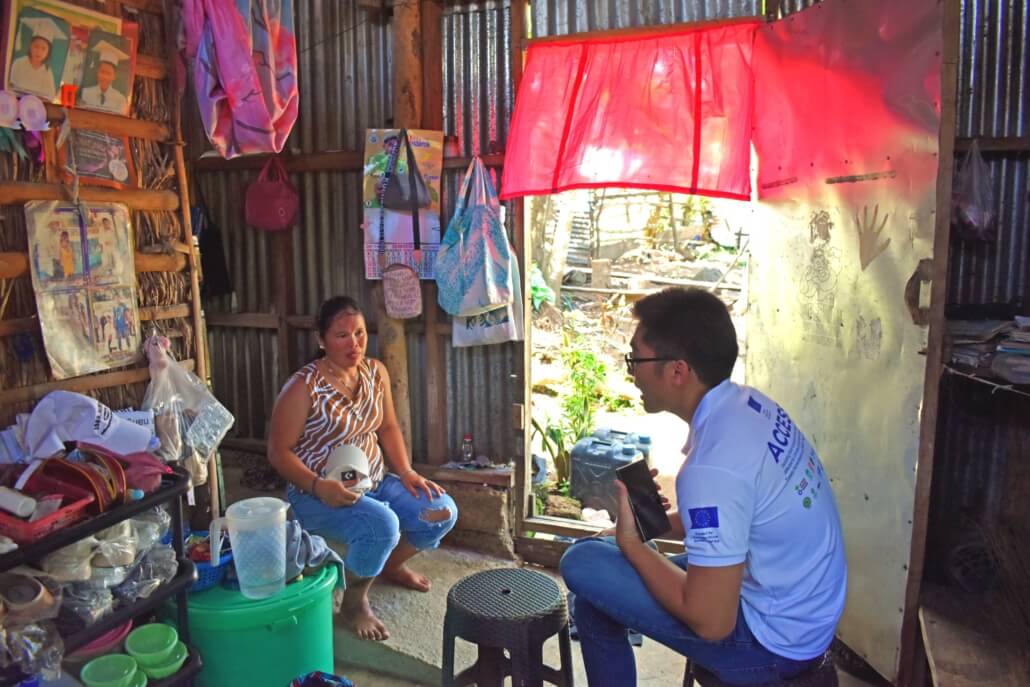
In photo: Joanna talks to Action Against Hunger team member inside her home in Barangay Miabas. Photo by Martina Vercoli for Action Against Hunger.
“When I saw my house in that state, I just couldn’t believe it. Many things were wet; others were broken,” Joanna recalls. “I couldn’t stop crying.”
“We can’t sleep when it rains; the children can’t rest properly,” she says. “We have to keep removing the water from the tarp.”
The storm left large parts of the roof torn off and weakened the wooden foundation. To keep the rain out, Richie and Joanna covered one section of the roof with tarpaulin. Their youngest child’s school supplies were irreparably ruined and had to be thrown away, which affected her schoolwork for several days.
Before Typhoon Opong, the family could sleep peacefully in their home. But after the storm, everything changed. Even light rain now makes them extremely anxious. “We just sit all together under a thick tarpaulin that covers the sleeping area of our house,” Joanna explains. The rest of the roof leaks badly, so the family gathers under the only dry spot. The tarpaulin catches the rainwater, and when the water starts pooling, they would try to drain it by poking the tarp with a stick so it does not collapse under its weight. “We can’t sleep when it rains; the children can’t rest properly,” she says. “We have to keep removing the water from the tarp.”
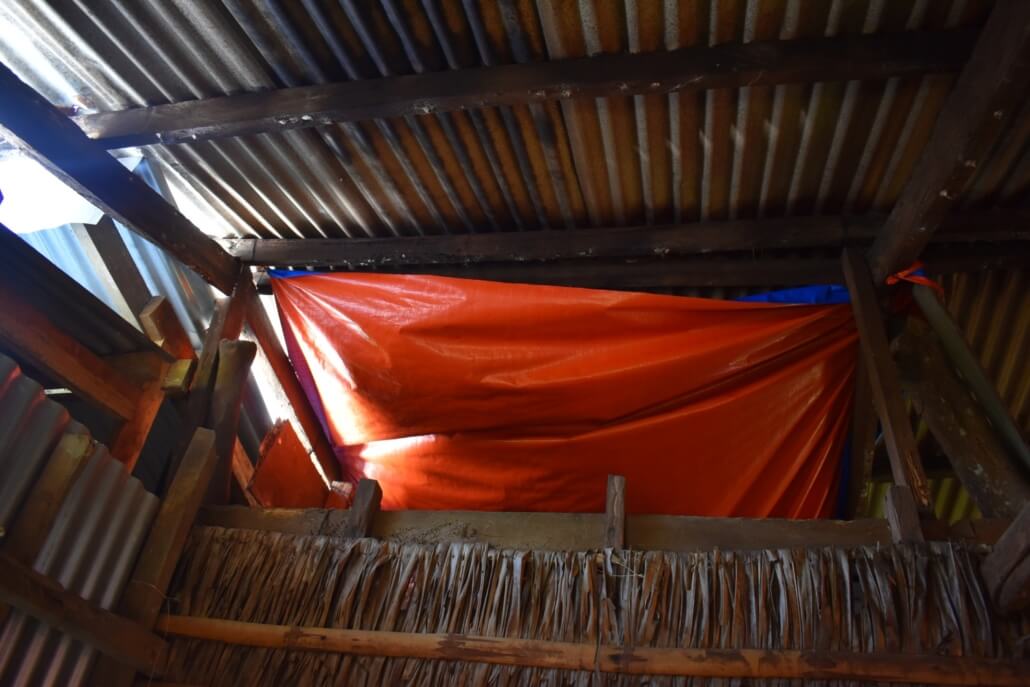
In photo: The tarpaulin covering the sleeping area of Joanna Pilapil’s house in Barangay Miabas, Palanas, Masbate. The family put it in place after the typhoon to protect themselves from rainwater leaking into the house. Photo by Martina Vercoli for Action Against Hunger.
Her husband, Richie, works in construction, but his job is unstable. He only earns when there are construction projects in the community, usually around 400 pesos a day, and considers himself lucky if he can work four days a week. Sometimes, he takes jobs in Manila, which is far from home. Joanna also works whenever she can, doing laundry and cleaning houses. These small jobs bring in 1,000 to 2,000 pesos a month when there is work available in the community. Their eldest child, now 19, could not go to college due to financial constraints. After finishing high school, he began working in a bakery to help with the family’s expenses.
“Everyone was affected by the storm,” Joanna explains. “The farmers who used to hire him, their crops are gone.”
After the typhoon, their main source of income was severely affected. Richie found it difficult to get construction jobs. “Everyone was affected by the storm,” Joanna explains. “The farmers who used to hire him, their crops are gone.”
The family’s financial situation worsened when their youngest child’s epilepsy required continuous medical care. Her medicines cost around 5,000 pesos a month, an amount the family can no longer afford. “I can’t even work that much anymore because I have to take proper care of her,” Joanna says, looking sadly through the empty wrappers of her daughter’s medicines. Then, she adds, “this month, I haven’t been able to bring her to her monthly check-up with the doctor. We have no money left. Now, food is our main priority.”
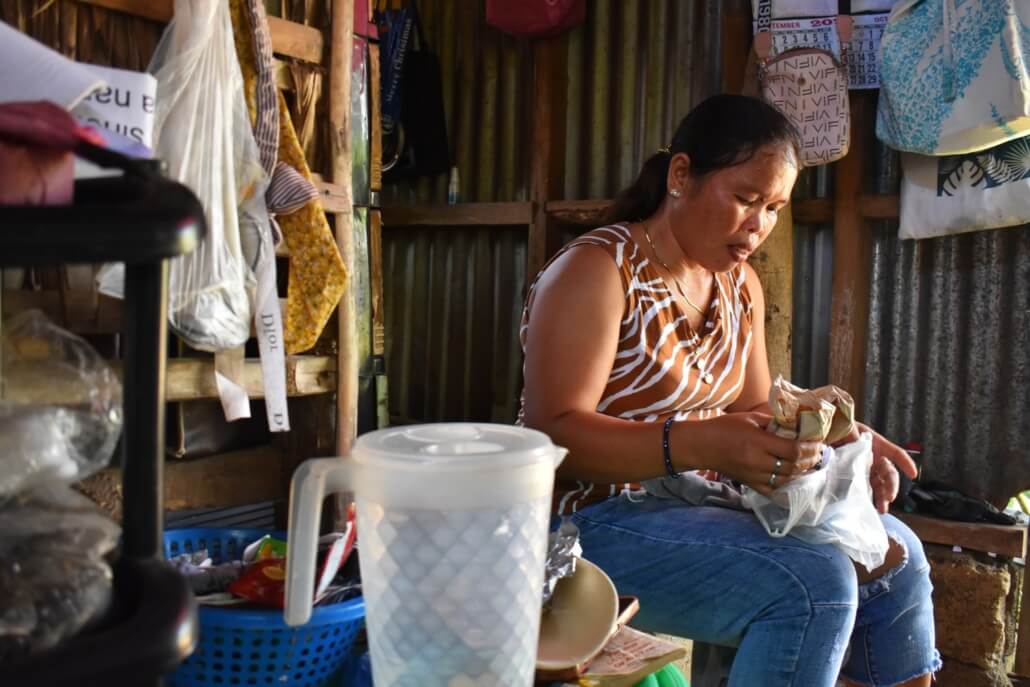
In photo: Joanna Pilapil, a resident of Barangay Miabas, Palanas, Masbate, looks through the empty wrappers of her daughter’s medicines, which she can no longer afford. Photo by Martina Vercoli for Action Against Hunger.
Access to clean water has also become a daily concern. Before the typhoon, the family bought a blue jerry can of mineral water for 35 pesos, enough for a week. Now, they cannot even afford to sustain it. “We get water from a well,” Joanna says, “not knowing whether it is safe or not. It is the only way we have to drink water.”
According to one of the residents, people in the community get their water from a well. After the typhoon, the water turned brown for a week, and there were reported cases of diarrhea and stomach aches. Even now, although the water appears clean, its safety remains in doubt. Residents boil it to make it drinkable, but cases of stomach aches and diarrhea are still being reported.
“Me and my husband prioritize our children’s nutrition,” Joanna says. “We give them food, and then he and I would share what is left.”
Food prices in the market have risen considerably. Despite a price freeze on commodities, nearby stores were selling goods at higher prices due to limited supplies. The family now buys one kilogram of the cheapest fish they can find for 200 pesos and makes it last for two weeks. Sometimes, they must buy on credit from the local store. They currently eat only twice a day instead of three times. Joanna then specifies: “Me and my husband prioritize our children’s nutrition,” Joanna says. “We give them food, and then he and I would share what is left.”
She worries especially about her youngest child, whose condition requires proper nutrition to prevent seizures.
Joanna shares the many responsibilities she manages at home while also working to support her family alongside her husband, and since the typhoon, even more has fallen on her plate. “Sometimes it is very hard for me,” Joanna admits. “I feel like I have a lot of responsibilities: managing household finances, taking care of the children and the house, working outside, and now also looking after some animals. Since the typhoon, it feels like I have even more to handle.”
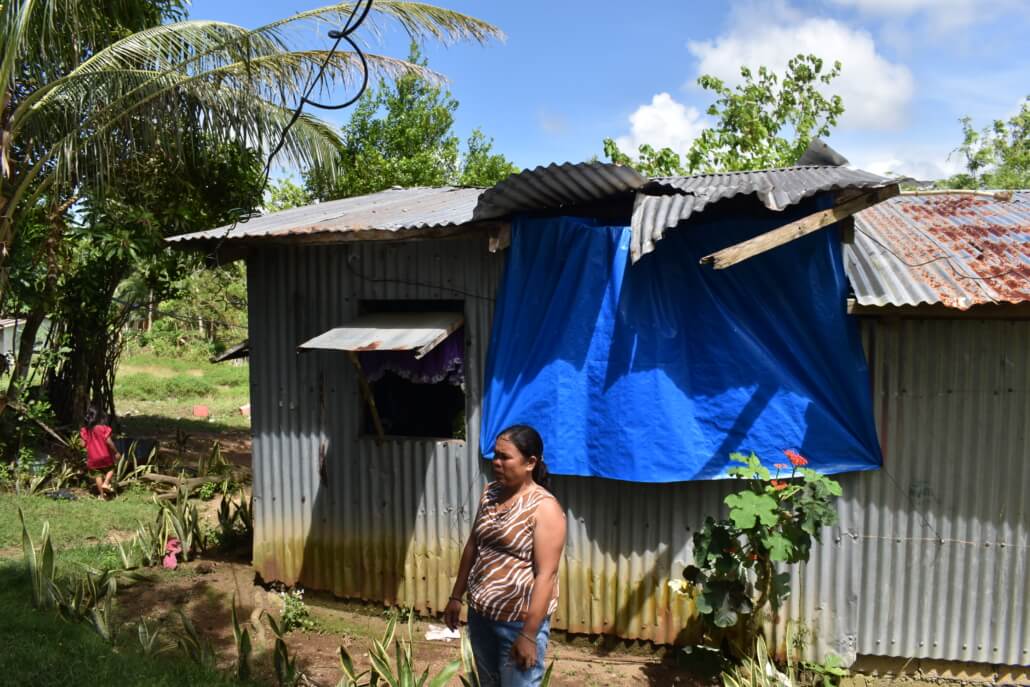
In photo: Joanna Pilapil stands in front of her damaged house in Barangay Miabas, Palanas, Masbate. Photo by Martina Vercoli for Action Against Hunger.
When Joanna talks about the food kit they received from the European Civil Protection and Humanitarian Aid Operations (ECHO), she bursts into tears. “It is such a big help,” she says. “It is the first time we received this much. The food received is going to last at least two months,” Joanna states. “I will try to make it last as long as possible.”
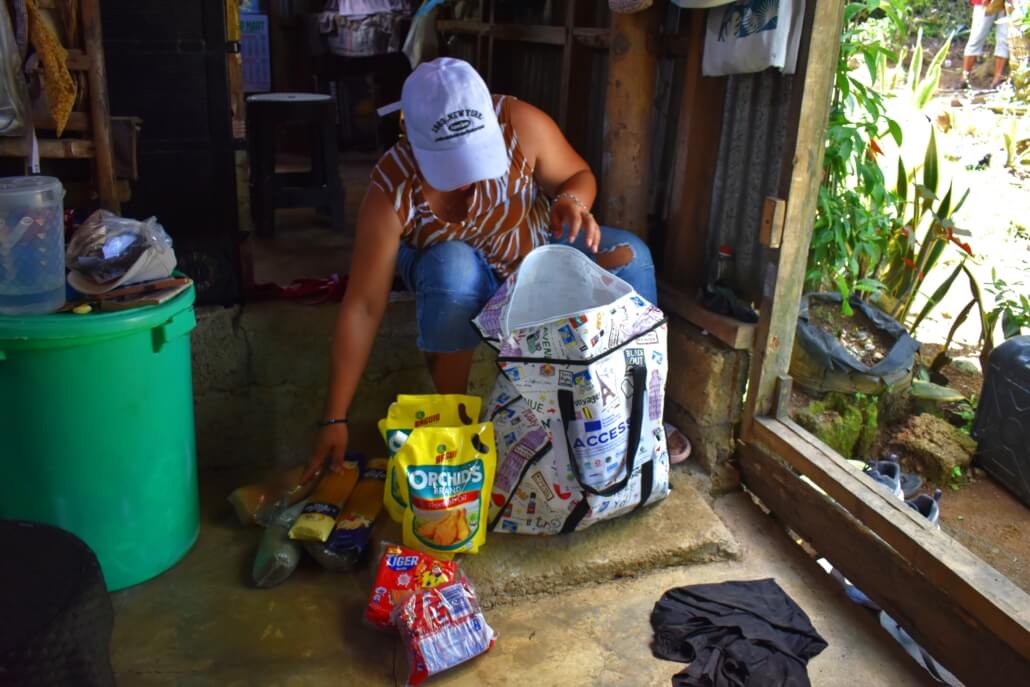
In photo: Joanna Pilapil, a resident of Barangay Miabas, Baleno, Masbate with the food kit she received from ECHO. Photo by Martina Vercoli for Action Against Hunger.
The assistance will allow her family to redirect the money they would have spent on food toward other priorities, such as their child’s medicines or repairs to their damaged house.
“It is such a big help,” she says. “It is the first time we received this much. The food received is going to last at least two months,” Joanna states. “I will try to make it last as long as possible.”
Even with this help, fear remains. “I am so scared another typhoon will hit our community,” Joanna admits. “Right now, we don’t have livelihoods, we do not have jobs, and we do not have money.”
Still, the aid they received gave Joanna and her family a much-needed sense of relief in a time of powerlessness. “We still haven’t returned to how things were before the typhoon,” she says quietly. “It is very far. Everything was gone when the disaster struck.” Yet, she adds with hope, “the help we received from ECHO will ease our worries. It is the beginning of our recovery. Our children will be able to have proper nutrition again.”
ACCESS (Assisting the Most Vulnerable Communities and Schools Affected by Complex Emergencies in Accessing Quality and Timely Humanitarian and Disaster Preparedness Services) is funded by the EU Humanitarian Aid.
This ACCESS Emergency Response provides multi-sectoral support to the most vulnerable indigenous peoples in hard-to-reach communities in Cagayan and Masbate that are affected by the impacts of habagat or southwest monsoon, and tropical cyclones Mirasol, Nando, and Opong; and in Northern Cebu that are affected by the impacts of the magnitude 6.9 Cebu Earthquake. This particular response is jointly implemented by ACCORD, CARE Philippines, Action Against Hunger, Community Organizers Multiversity, Humanity & Inclusion Philippines, Mindanao Organization for Social and Economic Progress (MOSEP), Oxfam Pilipinas, People’s Disaster Risk Reduction Network, Inc., Save the Children Philippines, and the United Youth of the Philippines-Women.
Written by: Martina Vercoli
Edited by: Joyce Sandajan


